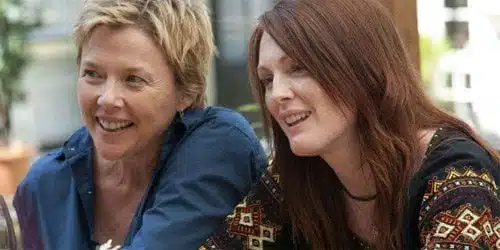
The set-up for The Kids Are All Right — two moms, two teenage children and one long lost sperm donor — would seem primed for either cheap laughs or self-righteous moralizing. Hollywood’s family films are rarely credited for understated and incisive observations on domestic relations. It is, therefore, such a relief that writer and director Lisa Cholodenko’s (High Art, Laurel Canyon) latest film does not yield to either temptation.
Set in an effortlessly hip and progressive idyll of Los Angeles, Nic (Annette Bening) and Jules (Julianne Moore) are a middle-aged lesbian couple with two teenage children. Their life together is filled with the comforts of middle-class privilege, but also visibly displays the wrinkles of imperfection that come with any longtime relationship. Nic, a successful physician, is so tightly wound that she only manages to relax after uncorking a bottle or more of wine at dinner. Her partner, Jules, is nearly the direct opposite and more of a bohemian whose free spirit seems unable to focus on one career path.
Though Nic and Jules have slightly drifted apart through routine and daily distraction, their relationship is strong and loving. Even if their marriage were in crisis, neither woman would be likely to directly articulate their concerns with one another. It’s one of the peculiarities of any marriage that the shorthand of communication developed between partners rarely addresses issues central to health of the couple.
As with most parents, Nic and Jules are far more comfortable discussing their shared concerns and frustrations regarding their children. Their eldest daughter, Joni (Mia Wasikowska,), is about to head off for college and all of the attendant hopes, fear and uncertainty that come with this transition can be felt. The strain from expectations, both imposed by her parents and herself, have started to reveal cracks in this otherwise self-assured and responsible young woman. As a character, Joni most clearly represents the changes this entire family is experiencing.
Roles are changing, responsibilities shifting, and old definitions of purpose may no longer apply. For 15-year-old Laser (Josh Hutcherson) the (not quite positive) influence of his friend Clay (Eddie Hassell) has indirectly resurrected interest in discovering the identity of his and Joni’s biological father. Propelled by this curiosity, Laser convinces a skeptical Joni to help him in tracking down the sperm donor. After a brief investigation, Joni discovers that the man, Paul (Mark Ruffalo) is an organic farmer and independent restaurateur who lives in Los Angeles.
Paul exudes an eternally cool and insouciant charm that is intoxicating and grating in equal measures. He was the coolest kid in high school and remains the coolest kid today. Though, with the introduction of Joni and Laser into his life, Paul begins to see that rebelling against growing up does not come without its sacrifices. He envies the unbreakable bond that Nic, Jules, Joni and Laser have, and longs for the love and support of a family.
Paul’s arrival into this family mix brings many moments of awkwardness and stirs up more than a few complications for all involved. It’s to Cholodenko’s credit that, as a character, Paul is not merely used as a comic foil. The inevitable chaotic force of his presence is blended with moments of great sensitivity and subtle truths about the imperceptible moments that interweave and bind people together.
What distinguishes The Kids Are All Right is that all of the characters are not merely types but, rather, fully realized individuals. Working from the smart and richly detailed script by. Cholodenko and Stuart Blumberg, each character is drawn with a novelistic precision that allows for grace and beauty to be revealed through the imperfections and idiosyncrasies of human behavior.
The entire cast is flawless in their individual roles but Bening (as Jules) is all together exceptional. Quite simply, the precision of her performance is stunning. So skilled and confident an actor is Bening that she allows the flaws of her character to act as the measured sketches to an unfinished, yet, completely engrossing portrait of one woman’s humanity. The larger contour of Jules’ individual truth and compassion could have been easily lost in less confident hands. Bening, though, has the skill and intelligence to trust that her character’s failings are never a diminishment of her love, power or individual self.
The Kids Are All Right is a difficult film to categorize. It’s billed as a modern family comedy but that distinction seems unfairly reductive. To be sure, there is great wit and humor throughout, but there is also a warmth, intelligence and generosity of spirit that broadens the movie beyond simple comedy.
Neither, though, is this a sentimental film that wishes to easily tempt or falsely comfort its audience through cheap or unearned emotions. Rather, The Kids Are All Right is something all together more undefined and messy. In short, it’s a film that brims with the beauty and wonder of normalcy.
It must be said that the film’s recent release on DVD offers little more in terms of supplemental material. The extras are rather lackluster and include only brief cast and crew interviews, a behind the scenes featurette and commentary from writer and director Lisa Cholodenko. That said, The Kids Are All Right is a smart and funny film that will surely be a hit at your family movie night.
